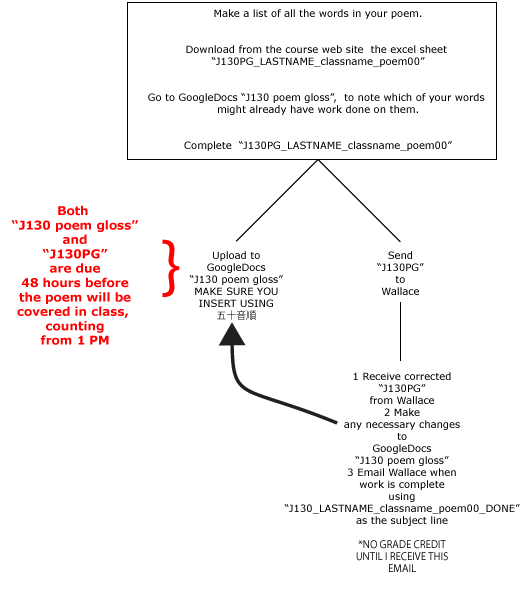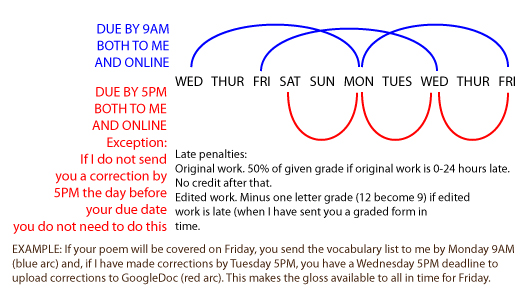Assignments & Tests
Quizzes
These have a separate page. Go to: Quiz procedures and facts "catchup" schedule
Poem glosses (PG)
Form
J130PG_LASTNAME_classname_poem00
Instructions
1. Check GoogleDoc J130 poems for report sign up to find out which poems you are responsible for.
2. Follow the below instructions. Refer FIRST to the GoogleDoc completed gloss items and this PDF to get a sense of what the gloss content should look like: J130 poem gloss instructions. Send to me using the email subject line J130PG_LASTNAME_classname_poem00".

Grading for this assignment
Late penalties:

- I will grade checking for accuracy: all words listed, their type, etc., correctly listed.
- I will also check your choice of definition.
- I will also check how useful your entry is to help towards understanding the poem.
The first two of these categories are most important but the usefulness aspect can sway the grade.
I will not write reasoning for the grade but the returned excel sheet should make it clear.
Poem report (PR)
Form
J130PR_LASTNAME_classname_poem00
Instructions
1. Check GoogleDocs J130 poem list for report sign-up to remind yourself of which poems you are responsible for. Of course, if you have not yet signed-up, please do so. You cannot select a poem already selected by another student.
2. Download the above form and complete it.
3. Submit on-time the form to me using the email subject line J130PR_LASTNAME_classname_poem00.
Grading for this assignment
Late penalties (same as above):
- Submitted before the deadline (1PM, 2 days before used in class): full credit
- Submitted by 24 hours (1PM, day before used in class) before the poem will be used: "C"
- Submitted after 8PM on the day before the poem will be used: "D"
- After that, no credit
- * Remember that no grade credit is given until you have sent me the final email notice that is listed in the instructions above.
Special warning:
- Please be extra extra careful to note all sources of your interpretations, including dictionaries if they gave you ideas. The severe penalties for not doing so are on the form.
Grading rubric:
- I will be asking questions like these: "Has the student taken care to filter information so that only what is particularly useful to this class is presented, not a deluge of details?" "Has the student used his or her research to help thinking deeply about the poem?" "Does the way the student handles my questions in class indicate that the information and ideas are well-rooted?"
- A grade is not given until after the day the poem is covered. If the student missed that day due to something very important and unexpected, the assignment is cancelled out and the student can resubmit a new report later.
Midterm 01
Grade issues
- This test is optional.
- I will grade it at the standard that I will use for the final, not from the perspective of "the students are just getting started". This will give you the best sense of where you stand with the final.
- The grades are for your reference only. They have no relevance to the final exam grade or the course grade.
Process
- The midterm will take the full period.
- You will be given two poems you do not know.
- You will be asked:
- (1) to identify every word, the 形 of 用言, whether or not there is 係り結び, what is modifying what, and so on.
- (2) You will be asked the basic meaning.
- (3) You will be asked to explain the poetry, the poetic effect of the poem.
- (1)-(2)-(3) are in that priority of grading. That is, if you cannot identify the words (1) even if you give a brilliant interpretation (3), your score is low. On the other hand, if you can identify the words (1) but can manage only an average interpretation (3) , your score is pretty good. So performance on (1) sets a standard for the next two (2)&(3) while performance on (2) sets a new layer of standards for the final segment (3).
The obvious point of this structure is that I want you to be able to analyze the grammar of a poem, for accuracy. However, at the other end, you need some intuitive sense of the, well, sensibility, of the poems of the time. Since this is an introduction class, I'm placing the emphasis on the basics, which is the grammar.
Neither (1) nor (2) nor (3) are easy--both take time to build, all are built by preparing and thinking about poems on a poem-by-poem basis.
Your best way to prepare for Midterm 01 is —
To review the poems covered so far on the three points above (1)(2)(3), including 七五調・五七調 and 上の句/下の句 The poetic techniques covered in introductory lectures might be useful, if any are in the poems I've selected.
Special testing situation:
I was unable to find poems that were bad enough that they are not online somewhere but good enough that you have a decent chance of figuring them out. I don't think these poems will be in a iPhone or iPad database, or a regular electronic dictionary. However I am not sure. I do think that, with a little effort, you can find them online. Not easy, but you might get lucky. So, you will be sitting in the same semi-circle as is usual but with your back towards me, so I can look over your shoulder and insure that you are using only dictionaries to look up words, not to look up poems, and that you are offline. The test is, otherwise, open book. (You can use your notes, conjugation charts, whatever.)
Final
There is a document on bSpace the describes the exam. That was put up several days ago and I think all of you already know about it. These are notes made the day before the final, as I put it together for you.
Dec 11 2:06 PM — 1) You should know the lunar months (1-2-3 = spring 4-5-6 = summer and so on) and it might be useful for you to be able to make the calculation back to the solar calendar (when you know the traditional lunar calendar day and want to know what that is on today's Western calendar, add about 5 weeks, so the first day of the first lunar month is around Feb 4). 2) It might be helpful to know the main dates and details of our authors Basho, Buson, Issa (not the others). While I am not testing this directly, I ask various questions of poems and, as sort of an extra credit thing, you may or may not find a way to use that information. I haven't checked to see if this is possible, so consider this additional tools to learn and put in your bag if you have time.
Dec 11 2:47 PM — And you might want to review your 係り結び rule.
Dec 11 3:27 PM — And you should review your grammar terms to read the gloss. Just these: 未然形、連用形、終止形、連体形、已然形、命令形、形容詞
Dec 11 4:22 PM — Final reminder: don't forget that I have asked in the past that you keep in mind the senses (sight, smell, etc.) when appreciating poems and that you also consider the sound structure of the poem. I have NOT explicitly asked about these things but there are hidden places when I expect you to touch on one or more of the above when discussing that poem.